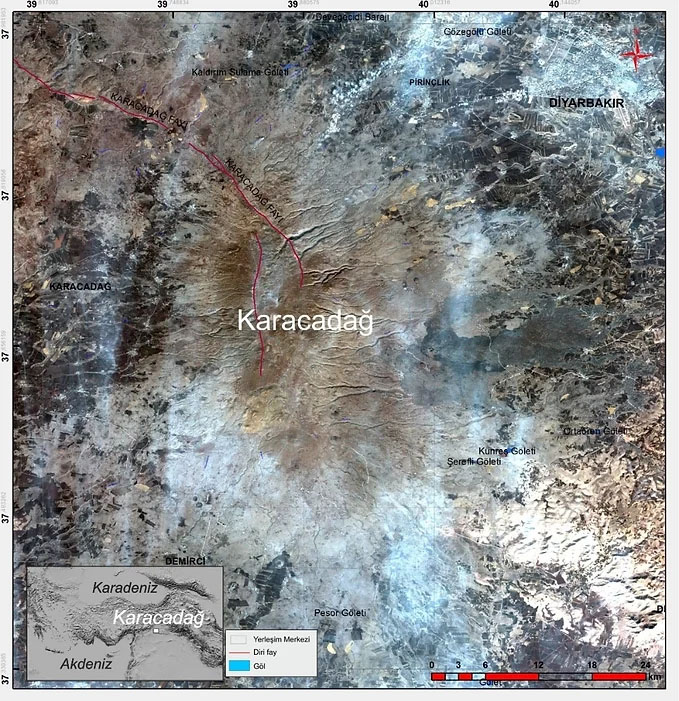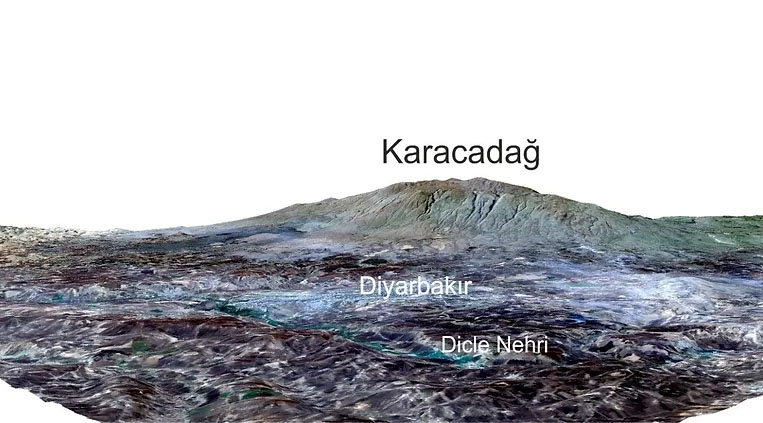Karacadağ
- Volcano type: Shield
- Volcano number: 213011
- Latitude: 37.67°N
- Longitude: 39.83°E
- Elevation: 1957m
- Distance to Ankara: ~650 km
- Closest major city: Diyarbakir ~40 km
- Population within 5 km: 2,157
- Population within 10 km: 6,718
- Population within 30 km: 93,286
- Population within 100 km: 2,344,496
Karacadağ, located in the Southeastern Anatolia region, is a shield type volcano located next to the province of Diyarbakır. Turkey's Iraqi-Syrian border is covered by basaltic lava in an area about the size 200x800km (Lustrino et al., 2010). Karacadağ volcano, which is characteristic with basaltic products, is a volcano typical with its flat topography at this border. Karacadağ, which has a peak height of 1957 meters, is a volcano that started in the Late Miocene and became active in the Quaternary period.
Volcanism, which started in the form of a fissure eruption in the plains in the Late Miocene, spread in the form of a plateau in its early stages, gradually accumulating in the form of a shield and shaped the Karacadağ volcano (Turkecan, 2015). The centers are generally located on northeastern opening cracks (Şaroğlu & Güner, 1981; Şaroğlu & Yılmaz, 1986). Depending on the radiometric studies conducted in the region, Karacadağ volcanism was found to be effective during the Late Miocene, Late Pliocene and Quaternary periods (Haksal, 1981; Ercan et al., 1990; Lustrino et al., 2010).
Although the lava flow age determination shows the middle Pleistocene periods, some lavas seem younger than this and are thought to belong to the Holocene period.

References
Ercan, T., Fujitani, T., Matsuda, J-I., Notsu, K., Tokel, S., Ui, T. 1990. ‘’Doğu ve Güneydoğu Anadolu Neojen-Kuvaterner volkanitlerine ilişkin yeni jeokimyasal, radyometrik ve izotopik verilerin yorumu’’, MTA Dergisi, 110, 143-164.
Global Volcanism Program, 2013. Karaca Dag (213011) in Volcanoes of the World, v. 4.7.7. Venzke, E (ed.). Smithsonian Institution. Downloaded 18 Apr 2019 (https://volcano.si.edu/volcano.cfm?vn=213011). https://doi.org/10.5479/si.GVP.VOTW4-2013.
Haksal, A. 1981. ‘’Petrographie und Geochemie des Schildvulkans Karacadağ’’ doktora tezi. Hamburg Üniv. Almanya.
Lustrino, M., Keskin, M., Mattioli, M., Lebedev, V.A., Chugaev, A., Sharkov, E., Kavak, O. 2010. ‘’Early activity of the largest Cenozoic shield volcano in the circum-Mediterranean area: Mt. Karacadağ, SE Turkey’’, European Journal of Mineralogy, 22, 343–62.
Şaroğlu, F., ve Güner, Y., 1981,. ‘’Doğu Anadolu'nun jeomorfolojik gelişimine etki eden öğeler: Jeomorfoloji, tektonik, volkanizma ilişkileri’’,: TJK Bült,. 24, 39-50.
Şaroğlu, F., ve Yılmaz, Y., 1986. ‘’Doğu Anadolu’da Neotektonik dönemdeki jeolojik Evrim ve Havza Modelleri’’,. Maden Tetkik Ve AramaMTA Dergisi, 107, :75–94.
Türkecan, A. 2015. Türkiye’nin Senozoyik Volkanitleri. Ankara: MTA Yayınları Özel Yayın Serisi-33.

